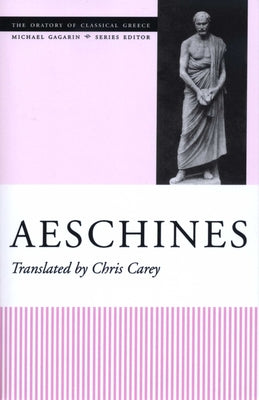1
/
of
1
University of Texas Press
Aeschines
Aeschines
Regular price
€30,95 EUR
Regular price
Sale price
€30,95 EUR
Shipping calculated at checkout.
Quantity
Couldn't load pickup availability
This is the third volume in the Oratory of Classical Greece series. Planned for publication over several years, the series will present all of the surviving speeches from the late fifth and fourth centuries B.C. in new translations prepared by classical scholars who are at the forefront of the discipline. These translations are especially designed for the needs and interests of today's undergraduates, Greekless scholars in other disciplines, and the general public. Classical oratory is an invaluable resource for the study of ancient Greek life and culture. The speeches offer evidence on Greek moral views, social and economic conditions, political and social ideology, and other aspects of Athenian culture that have been largely ignored: women and family life, slavery, and religion, to name just a few. This volume contains the three surviving speeches of Aeschines (390-? B.C.). His speeches all revolve around political developments in Athens during the second half of the fourth century B.C. and reflect the internal political rivalries in an Athens overshadowed by the growing power of Macedonia in the north. The first speech was delivered when Aeschines successfully prosecuted Timarchus, a political opponent, for having allegedly prostituted himself as a young man. The other two speeches were delivered in the context of Aeschines' long-running political feud with Demosthenes. As a group, the speeches provide important information on Athenian law and politics, the political careers of Aeschines and Demosthenes, sexuality and social history, and the historical rivalry between Athens and Macedonia.
Author: Chris Carey
Publisher: University of Texas Press
Published: 08/01/2000
Pages: 293
Binding Type: Paperback
Weight: 0.70lbs
Size: 8.47h x 5.52w x 0.70d
ISBN: 9780292712232
Author: Chris Carey
Publisher: University of Texas Press
Published: 08/01/2000
Pages: 293
Binding Type: Paperback
Weight: 0.70lbs
Size: 8.47h x 5.52w x 0.70d
ISBN: 9780292712232
About the Author
Aeschines' speeches are introduced and translated by Chris Carey, Professor of Classics at Royal Holloway, University of London.
Share


